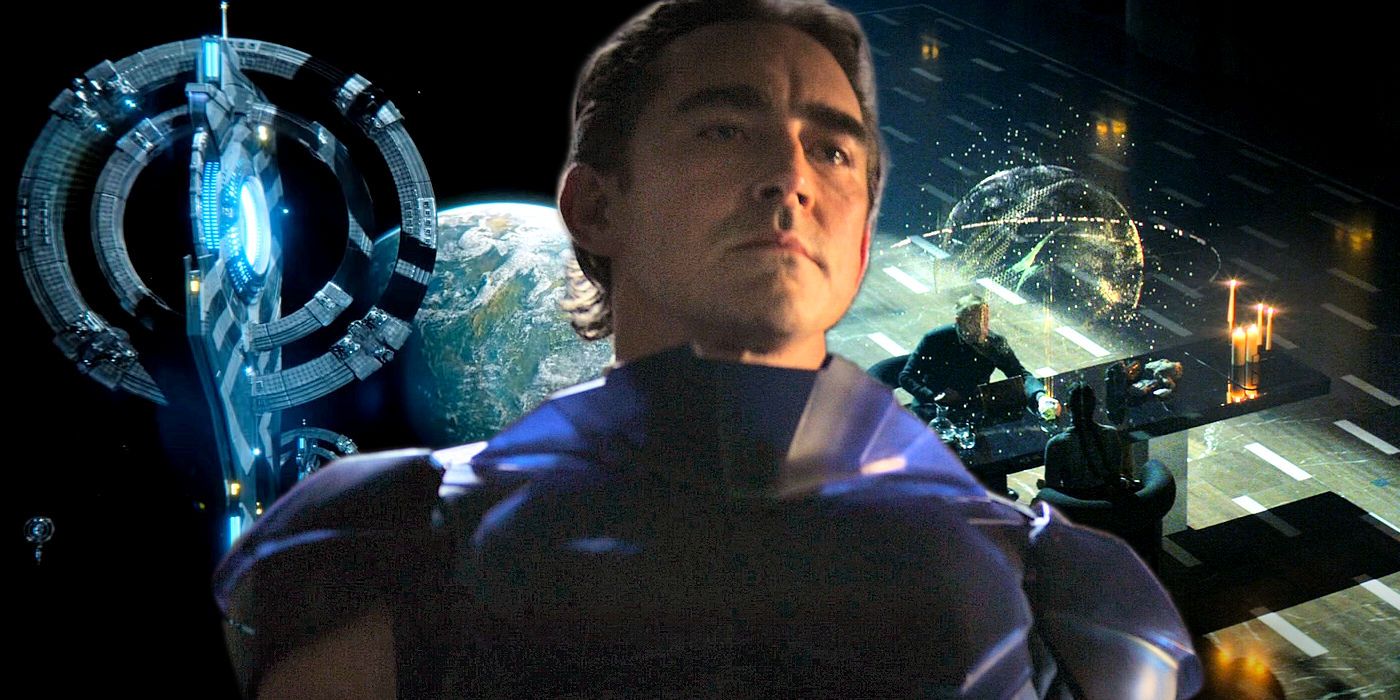The Dark Herald Barely Recommends – Foundation

This show is a borderline case. There are elements that make it compelling from time to time but when all of these elements are taken together as a whole, it left me feeling empty. This is not a feel-good show. That would be okay if it was actually a good show and half of it isn’t.
My rule of thumb for my Does Not Recommend rating is that there be no reason at all to watch it. And there is reason to watch this show and it’s the Genetic Dynasty subplot.
Which you will not find in Isaac Asimov’s Foundation. The truth about that book is, it is nowhere near as good as its reputation would have you believe. The characters are pancake flat, the dialog is unengaging, and the descriptive passages leave no lasting impression. In fairness to the rest of Asimov’s body of work, it’s all pretty much like this.
That means it did not lend itself at all to screen adaptation. Whoever got the reins of this property was always going to have to heavily rewrite it.
The showrunner is David Goyer, whose work I have found surprisingly tolerable in the past. Dark City, Batman Begins, The Dark Knight, (although not, Dark Knight Rises which might explain a thing or two). He cut his teeth on the 1993 version of Heinlein’s Puppet Masters. He appears to have some respect or at least interest in Appendix N authors and has some actual talent as a writer.
His version of Foundation is so far, more interesting than Asimov’s. Although it has a very slow start, as well as a low bar to stumble over. If you are going to watch the first episode skip the first twenty minutes, you won’t miss anything.
The visuals are great. Can’t deny that they do their job.
Trantor is everything that Coruscant should have been, namely a supporting character in its own right, with its own story to tell. There is no ground on Trantor, the entire planet is one great machine with a powerfully built and with ornately fashioned skyhook reaching up to orbit. The art design is reminiscent of the Greek revival with a heavy emphasis on pillars. Particularly the skyhook.
Basically, it looks like Kiatain from Dune. An ancient empire at its height but decaying.
This TV series feels a lot more like Dune. This is probably because Frank Herbert created the tropes most associated in science fiction with a galaxy-spanning space dynasty that is in terminal decadence.
That was what I wrote about the pilot episode. The rest of the show didn’t live up to it.
There were two concurrent plots running. The one on Terminus and the one on Trantor.
The one on Trantor is in fact the only one worth watching.
The one on Terminus was completely predictable from start to finish. I strongly suspect this was the plot that was getting a ton of production notes from the higher-ups at Apple. These were the good guys after all. The progressive and diverse people who were sent into exile to build the foundation of the structure that would take over the universe. In short, the good people who buy Apple products.
And this subplot is Woke with a capital Woah. Salvor Hardin is both race and gender-bent. She is of course the most super extra special, bestest evah, special one there has ever been. Like any Mary Sue, she is boring as hell. Her plotline is fundamentally tedious from the start because the hurricane of dog-whistling this show blasts through the screen, lets you know in no uncertain terms that this woman will have plot armor made of 20-foot-thick diamond. She will not be in any danger because it is impermissible that she be harmed, and she will not fail because that would be unspeakable sin in the CRT Church.
The diversity and inclusivity is so far off the chart any man with an IQ higher than 110 will keep asking himself, how are there any minorities left at all? There shouldn’t be. Not when damn near all the heterosexual relationships are mixed race.
Or at least the good guys all have mixed-race relationships.
Back in the days of the Motion Picture Production Code. There were things you couldn’t say and tropes you had to adopt once you, “said them.” For instance, you couldn’t say the word, “divorce.” So, instead, the writers would use the term, “come back from Reno.” Because Nevada had the most lenient divorce laws. At the start of Invasion of the Body Snatchers (1956), the male and female romantic leads both say that they have “come back from Reno.” That told the audience right off the bat that their love would end in tragedy because divorcees were NOT permitted happy endings. That was the Reno Rule.
In Woke shows that rule now applies to straight white couples. Which is what happened to Brother Dawn’s romance.
Trantor is the capital of the Empire, and it is ruled by Genetic Dynasty. There are three of these rulers at any time, all of them are clones of the founder of the dynasty, Cleon I.
Brother Dawn, Brother Day, and Brother Dusk, each corresponding to the stages of a man’s life. Brother Dusk while still an emperor in his own right, acts more as a senior counselor and defers to Brother Day as the active ruler of the empire. Brother Dawn is the child-emperor in training. When Brother Dusk reaches a certain age, he becomes Brother Darkness and after an intimate ceremony with the rest of the Imperial Family where he meets the new infant Brother Dawn, he is disintegrated. Allowing the circle of life to continue. Or so it seemed.
The new Brother Dawn was defective. Nothing too bad you would think, he was left-handed and color blind. But these things meant he was not a perfect copy of Cleon I. If his elder brothers discovered this, he would be replaced. Stand-by clones are kept in tanks with up-to-date memories for the purpose of immediate replacement should the need arise. If his defects were discovered, Brother Dawn would skip to the head of the line to be the new Brother Darkness.
Brother Dawn lived a life of quiet terror, waiting for the day his secret came out. It made him more isolated than even most royals. One day he began a relationship with a gardener girl throughout the course of the first season he falls in love with her and she (to all appearances) with him, but it wasn’t what it appeared to be.
It was a good story but because of the new Reno Rule, I saw what was coming a mile away. I absolutely knew she was going to betray him at some point.
Brother Day and R Daneel have their own rather intriguing subplot, the presiding emperor needs to be present during the selection of the new head of one of the major religions. However, the question of do clones have a soul? Becomes central to this selection.
The Hari Seldon subplot didn’t work because it was once again, predictable. When Asimov wrote Foundation transcribing a human brain onto a computer wasn’t even a concept. Now it is, and it was obvious that that was what had happened to him after he arranged his own murder. And that was also obvious. Gaal Dornick having a tantrum about her own personal free will when she knew she was trying to set up a world based on mathematical predestination, was childish. Sure, Psychohistory applies to everyone else, BUT NOT ME!!!
However, the biggest problems with this show feel like the result of interference from the corporate overlord. Apple has absolutely no reason to be involved with TV. But the CEO wants to hang out with celebrities. Consequently, Apple is sinking a lot of money into something that Steve Jobs wouldn’t have touched with a thousand-foot pole. This is a multi-billion-dollar hobby business for Tim Cook. Which means, this streaming service is going to reflexively reflect the fashionable politics of the Baizou Left.
Regardless, I won’t spoil the whole thing for you. If you have purchased an iPhone or a Mac you already have access for a year. So, if you give in to your curiosity and watch it, you will be reasonably entertained if you skip through the Terminus storyline and just concentrate on the Imperial Family’s drama.
The Dark Herald Recommends with Pronounced Reservations.

